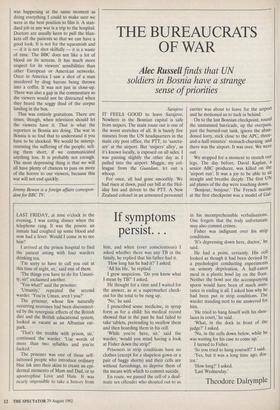If symptoms persist.. .
LAST FRIDAY, at nine o'clock in the evening, I was eating dinner when the telephone rang. It was the prison: an inmate had coughed up some blood and now had a fever. Would I come in to see him?
I arrived at the prison hospital to find the patient sitting with four warders drinking tea.
'I'm sorry to have to call you out at this time of night, sir,' said one of them.
'The things you have to do for Umani- ty, sir!' exclaimed another.
'You what?' said the prisoner.
`Umanity,' repeated the second warder. 'You're Uman, aren't you?'
The prisoner, whose few naturally occurring neurones had been disconnect- ed by the synergistic effects of the British diet and the British educational system, looked as vacant as an Albanian car- park.
'That's the trouble with prison, sir,' continued the warder. 'Use words of more than two syllables and you're fucked.'
The prisoner was one of those self- tattooed people who introduce ordinary blue ink into their skins to create an epi- dermal memento of Mum and Dad, or to apostrophise Love and Hate. It was nearly impossible to take a history from him, and when (ever conscientious) I asked whether there was any TB in the family, he replied that his father had it.
`How long has he had it?' I asked.
`All his life,' he replied.
I grew suspicious. 'Do you know what 1 mean by TB?' I asked.
He thought for a time and I waited for the answer, as at a supermarket check- out for the total to be rung up.
'No,' he said.
I prescribed some medicine, in syrup form as for a child: his medical record showed that in the past he had failed to take tablets, pretending to swallow them and then hoarding them in his cell.
'While you're here, sir,' said the warder, 'would you mind having a look at Fisher down the strip?'
Prisoners in strip conditions have no clothes (except for a shapeless gown or a pair of baggy shorts) and their cells are without furnishings, to deprive them of the means with which to commit suicide.
En route, we passed the cell of a deaf- mute sex offender who shouted out to us in his incomprehensible verbalisations. One forgets that the truly unfortunate may also commit crimes. Fisher was indignant over his strip conditions.
`It's depressing down here, doctor,' he said.
He had a point, certainly. His cell looked as though it had been devised by a psychologist conducting experiments on sensory deprivation. A half-eaten meal in a plastic bowl lay on the floor. Neither the bowl nor the accompanying spoon would have been of much assis- tance in ending it all. I asked him why he had been put in strip conditions. The warder standing next to me answered for him.
`He tried to hang hisself with his shoe- laces in court,' he said. 'What, in the dock in front of the judge?' I asked. 'No, in the cells down below, while he was waiting for his case to come up.' I turned to Fisher.
'So you tried to hang yourself?' I said. 'Yes, but it was a long time ago, doc- tor.'
'How long?' I asked.
`Last Wednesday.'
Theodore Dalrymple


















































 Previous page
Previous page